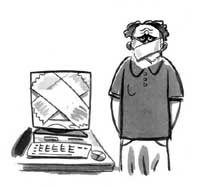Freedom of expression - at what price?

Below is an interesting article which I read online from Chicago Tribune. The author eloquently writes about recent incidents and cases in Europe involving freedom of expression and the price it comes with.
He says that from the Danish cartoons to denying the Holocaust, mixed messages are being sent on free expression. The article is titled Freedom of speech garbled.
Here it goes. Enjoy reading it.
By Tom Hundley, the Tribune's chief European correspondent, based in LondonPublished February 27, 2006
LONDON -- These are fraught times for free speech and freedom of expressionread my other blog
in Europe.While newspaper editors debate the right or wrong of publishing a
dozen Danish cartoons mocking the Prophet Muhammad, a judge in Austria gave
Holocaust denier David Irving a 3-year prison sentence for a speech he made 17
years ago, though Irving now says he sees the error of his ways, sort of.
The same words and ideas that cost Irving his fortune and reputation in
London--he lost a libel suit against the American academic Deborah Lipstadt in
2000 and was ordered to pay $3.2 million for Lipstadt's legal fees--have cost
him his liberty in Vienna.
Meanwhile, Abu Hamza al-Masri, the former London nightclub bouncer turned
jihadist preacher, has been sentenced to 7 years in prison by a British judge
for inciting religious hatred and soliciting murder.
So, it seems that denying the Holocaust is not a crime in Britain, but
calling for jihad is; while in Austria--a country that spent decades denying its
own complicity in the Holocaust--Holocaust denial can land you in jail, but
calling for jihad might, at worst, get you deported.
Opinion polls indicate that most Britons think Abu Hamza got off too easy.
At the same time, Irving's jail sentence aroused little sympathy but a lot of
shock.
"However nauseating, these people should be confronted in debate rather
than chucked into jail and turned into martyrs," Anthony Beevor, the World War
II historian and author, told The Times newspaper.
"Just plain bonkers" is how Shami Chakrabarti, director of Britain's most
respected civil liberties organization, described Irving's jailing.
Lest anyone think that Britain turns a blind eye to anti-Semitism, London
Mayor Ken Livingstone, who is known for reaching out to his city's Muslim
community, was last week punished with a four-week suspension from his job after he accused a Jewish journalist of behaving like a concentration camp guard.
The remark, delivered in the heat of the moment, was dumb, but the mayor
refused to apologize. The Standards Board for England, which oversees the
conduct of local officials, ordered the highly unusual suspension after deciding
that Livingstone's gibe was "unnecessarily insensitive."
For Muslims, especially the 15 million living in Europe, these verdicts and
the public reaction to them suggest a confusing double standard.
Europe's free-speech waters were further muddied this month when a jury in
the English city of Leeds acquitted Nick Griffin, leader of the far-right
British National Party, of race-hate charges, and failed to reach a verdict on
several other related charges.
The BNP, which has miniscule support in Britain, adamantly opposes
immigration and multiculturalism. After the verdict, Griffin told supporters
that Britain had to decide whether it wanted to be an "Islamic republic" or
remain "a free, Western, democratic society."
Voicing similar sentiments earned Austrian far-right politician Joerg
Haider 27 percent of the vote in national elections seven years ago. Although
Haider's star has faded in recent years, France's Jean-Marie Le Pen did well
with the anti-immigration theme in France's 2002 election.
The BNP is cashing in on the cartoon controversy, using the most
inflammatory image--the one showing the Prophet Muhammad with a bomb in his
turban--in a new campaign leaflet.
"We owe it to our children to defend our Christian culture," the leaflet
says.
European civil libertarians say free speech is a matter of context.
Countries such as Germany and Austria have good reason to restrict speech that
glorifies the Nazis or minimizes their crimes.
It is an acknowledgment of guilt and responsibility, and a legal mechanism
for preventing a recurrence.But some things that Germans view as tasteless,
dangerous and offensive, are for the English, especially English soccer fans,
absolutely hilarious.
Germany hosts this summer's World Cup, and German officials have made clear
they no longer will tolerate the long-standing habit of English fans who taunt
their German counterparts with stiff-armed salutes and comically exaggerated
Basil Fawlty goose-steps, silly stuff that English fans would describe as
"having a laugh."
Perhaps it was this spirit of fun that moved Irving to address his Austrian
judge as "Mein Fuhrer." Not a smart move.


1 Comments:
الروضة
تركيب جبس بورد دبي
شركات دهان في الشارقة
Post a Comment
<< Home